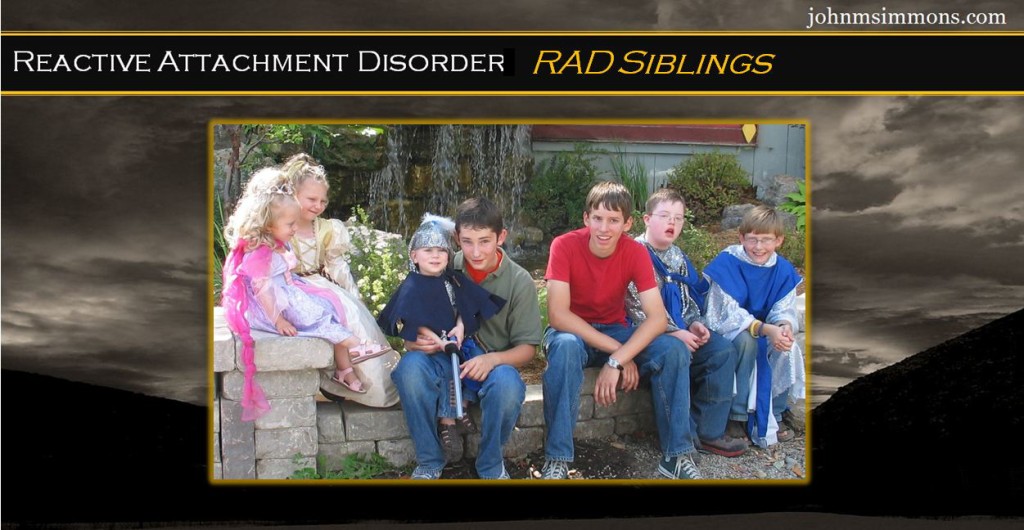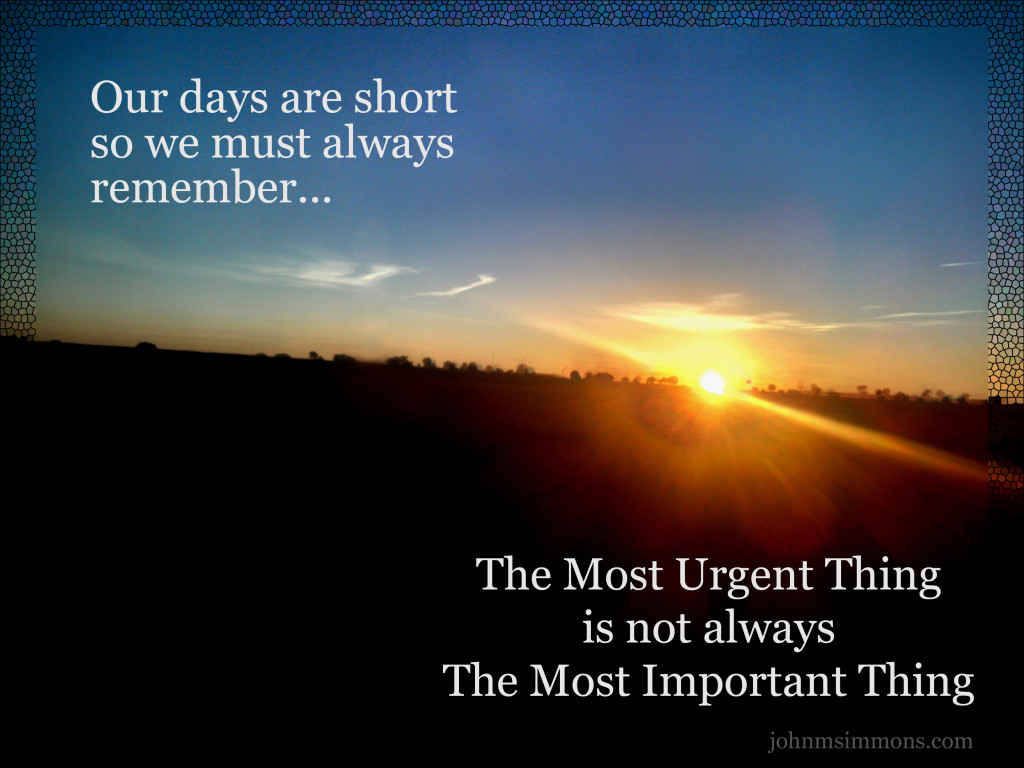RAD Siblings: Reactive Attachment Disorder
The most urgent thing is not always the most important thing. Our other children, the RAD siblings, need us too.
This One’s for Chelsea Stump and all the RAD Siblings Like Her. I Love You.
In case you wonder, I don’t get through the writing of articles and comments that I address without a few tears. Your stories and lives touch my heart because I know where you are coming from. I know how hard it is. I have been there. But this week, I was especially touched when I saw a comment from a cheerful teen named Chelsea. I can’t stop thinking about her because she reminds me of some of my own children. And now, I can’t stop crying for RAD siblings.
Chelsea Stump Hi. I am an older sister to 4 RAD kids. I was wondering if you had any advice or articles for siblings of RAD kids. It’s hard not being able to have friends over or time with my parents because they are too busy dealing with my siblings. Just wondering if you had any advice for us siblings out there! 
The most urgent thing is not always the most important thing. Our other children, the RAD siblings, need us, too.
RAD parents… we need to do better. We need to come to terms with something very important, right now. The most urgent thing is not always the most important thing. Our other children, the RAD siblings, need us, too. We must find some reasonable amount of time to spend with the RAD siblings and leave insurance to cover the damage elsewhere. These children love us. They know how hard it is for us, so they often decide to not add one more stress, no matter how small, to our load. Some, like Chelsea, remain cheerful and seek help outside the home, hoping not to trouble the parents that they love. Others become resentful of their traumatized siblings. Finally, (and rightfully so) they become resentful of their parents. At times they turn to harmful ways of trying to deal with the pain. Then we blame our children who suffer from Reactive Attachment Disorder for the troubles of the RAD siblings, forgetting that the condition of the traumatized children is not their fault, either.
When we take the RAD siblings for an activity while leaving out the others, the RAD siblings feel guilt.
Some people advocate segregation in the family, setting aside time and activities for “the good kids” while leaving the “bad kids” with friends or family. I feel like such segregation does far more damage than good, across the board. The children with Reactive Attachment Disorder already have difficulty with feeling like they aren’t worthy of family. When we segregate, it only makes matters worse for them. We don’t need to parent our children with significant difference. I know you are shocked with me saying that, but here is a video from a research scientist who will have you understanding in just a few minutes. Furthermore, when we take the RAD siblings for an activity while leaving out the others, the RAD siblings feel guilt. It just doesn’t work. I advocate for including the whole family for family activities even though it comes with a whole truckload of challenges. Though it is an exhausting and never-ending scenario we can use the same principles that we use for making time with marriage partners in making time for RAD siblings. We can (AND WE MUST) make time to spend with individual (or perhaps pairs of un-traumatized (or should I say, less traumatized?)) children as long as we aren’t taking all of “the good ones” while leaving all of the “bad ones.” I know I shouldn’t say “good” and “bad,” but I say it with purpose. Those words are what our children think we are saying (with our actions) when we turn to these solutions.
Increase your homeowner policy and decrease the deductible. Make sure that the event happens for the RAD siblings, regardless.
I don’t know how to answer Chelsea’s comment about it being difficult to not be able to have friends over. Because of extreme behaviors in our homes, and particularly with the tendency children with Reactive Attachment Disorder have to sabotage events, is difficult. But we can set up a time to take a RAD sibling out for an activity with her friends. Always set up plans several contingencies deep. Have the other spouse ready to take the other children and a backup to take other kids for the spouse when one child decides they will stop the event with behavior. Increase your homeowner policy and decrease the deductible. Make sure that the event happens for the RAD siblings, regardless. Eventually, the children with Reactive Attachment Disorder will learn that their behaviors do not stop these events. We can even use such scenarios as a carrot to encourage good behavior with our children from trauma. “Look, Sweetheart. I would like to spend time doing something fun with you like I’m doing with Chelsea. But I had to spend our fun time at the school, talking to your teacher, yesterday. Can we make plans for you and me to go get ice cream next Friday if I don’t need to go to the school next week?”
Failure is not an option. Our children, the RAD siblings, are too important for us to fail in this endeavor.
Of course I don’t know all of the answers. I don’t know all of the problems that exist in your home nor can I relate to how few family or friend resources you might have. But I do know the problem. And the problem is serious enough that we need to find at least minimal solutions, no matter how difficult it is. This is an area where we need to do better. As the famous quote from the movie Apollo 13 put it, “Failure is not an option.” Our children, the RAD siblings, are too important for us to fail in this endeavor.
Wow, Chelsea. Do I have any advice for you? I feel like the Perfect Example just asked me if I have any advice for Him. Um… no… no… I think you’re doing great… um, thanks for askin’, though… No, Chelsea. I don’t have any advice for you. I bow at your feet and ask you to forgive us, I beg you to be patient with our failures and weaknesses, and to help us to do better. I love you. Thank you. For everything.
RAD siblings, we are your parents. Some people despise us. Some honor and revere us, little as it matters to us. Like Sir Isaac Newton, we stand on the shoulders of giants. You bear us up. And when we, your parents grow up, we want to be like you. But an Eternal Example has taught us… we can’t take away your pain, yet. We would take away the cup if we could, but we can’t. The cost would be too great. Your suffering breaks our hearts and we shed tears that you don’t see, wanting more than almost anything, to take it away. But your suffering saves lives and souls. If you are willing, we must continue. We’ll bear you up. We’ll honor your names. One day this painful reality will pass and you will see all the good that is, that exists, because of you. And all the knowledge, love, experience, respect, honor… really, all we have (that matters) will be yours.
For Chelsea and all those other RAD siblings out there, I will beg for one favor from you. I know you don’t want to do it. I know you don’t want to cause your parents any more stress. But believe me when I say, they need this article. It shouldn’t cause them more stress. It should help them to be able to slow down enough to stop missing the forest for the trees. This article should help them to be able to plan and to reduce stress. Please! Please share this with your parents, no matter how awkward it seems. Once more… I love you. I fear not for a country and world that will be led by your generation. If fact, I look forward to it with great anticipation! You will fix what we broke.
I just want to clarify. This article was not directed at Chelsea’s awesome parents. If anything, it’s a warning call to me and my own family; and a friendly “heads up” to any parents whose children with RAD keep them hopping. No one has complained, but as I re-read the article, I was concerned that it wasn’t very clear in that respect. Other members of the Stump family are frequent commenters, here. They are an incredible family and we would all do well to be more like them. 
Okay, wait! For those who disagree with my thoughts on separating our activities for groups of children, you need to check out the comments section for this post on my Facebook page ( https://www.facebook.com/johnmsimmons.author ) use the link and scroll down until you find the post for this article: RAD Siblings. Mary Elizabeth is an adult who grew up as a child with Reactive Attachment Disorder. Her comments are always great and are of extreme value to us because she sees the story from a perspective that most of us can’t. If you disagreed with my thoughts about separating activities, you will love Mary’s. Read what she has to say! Then keep scrolling. Though everyone has been incredibly nice, not everyone agrees with me. And to everyone… thanks for loving me and returning to read my articles, even when we don’t quite agree. While I’m still not ready to walk away from my thoughts on this subject, here’s a newsflash: John isn’t always right! Just ask my wife.
If you would like a full size copy of the urgent/important poster, it’s yours. I don’t need your email address and you don’t need to register. I promise I’m not gathering information from your computer and there are no viruses. If you can print this picture and use it to help you and your family, I simply want you to have it with no strings. Simply click this link of Urgent/Important. When the picture opens, right-click on it. Select “Save Image As…” from the choices. On the left side of the box that appears, click on desktop. Then click on “Save.” The icon for the picture will then be on your computer desktop. If you have trouble, get the kids. They won’t even need these instructions.
Please don’t feel like you need to ask, to share. 
Often, readers receive as much help from other readers in the comments section as they do from the blog article, itself. Please be generous with your thoughts and experiences in the comments section. There are lots of people who need what you have to share. This is your chance to help them.
Read more blog articles by John M. Simmons about Disorders/Mental Illness
Return to John M. Simmons’ Blog
Ensure you don’t miss anything when you sign up for notifications


